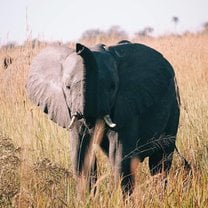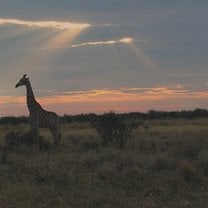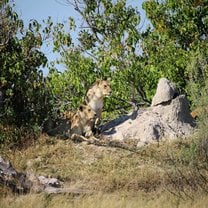For the volunteer work at Care for Wild I have mixed emotions and cannot fully recommend it to just everybody. I will go into more detail in the following.
Volunteer Work: One works for about 8 hours a day, which mainly includes hard physical work (cleaning the bomas and haying) while the rhinos are in another area. If you have any problems with knees, back, hay fever or dust allergy, probably best not to go there because you‘ll be confronted with it all the time. It’s hard work, so one should know that beforehand. Staff jokingly calls volunteers slaves and honestly that‘s what it feels like sometimes.
Interaction with Rhinos: One gets to bottlefeed rhino babies through a fence 2-3 times a day for about 5 minutes and that’s about all the rhino interaction that one gets. There is no time to just watch the rhinos, or even pet or play with them. This is definitely in the best interest for the rhino! However, pictures on Instagram and Facebook are very misleading as one can see staff members petting and playing with them. But as a volunteer the only interaction one gets is during the 5 minutes when feeding the babies through the fence. There is only little time to observate the rhinos behavior. Again, I completely understand why it has to be that way but the marketing on Instagram is misleading and should maybe be improved, as well as the wording on the website about the volunteer work.Sometimes staff will take you on game drives for about one hour after work, which is very nice and rewards you for the hard work.
Accommodation: Very basic and tiny cabins for 3-4 people (about 6m^2) with bunk beds. Showers are full of mould and there’s quite a few spiders and bugs in the room. One can hear every word the neighbors say as well so definitely bring ear plugs. At night it got down to 7 degrees (September) and that’s the temperature we had in our rooms as well. Most people caught a slight flu because it was so cold and we only had ice cold water in the shower for about one week, which has been fixed after contacting someone from ACE who got CFW staff to fix the issue.
The place puts an emphasis on the rhinos rather than on volunteers which is definitely the right way, however I just try to give new volunteers a better insight before they arrive.
Food: Good food is provided three times a day. It’s usually meat and a side for every meal. If you want less meat and some veggies instead you should opt for the vegetarian option beforehand. Water is provided as well.
Management of volunteers onsite: Staff is really nice but they‘re not trained to manage people. When it gets down to pick things that the volunteers want to do, the one that screams the loudest gets to do the best things. This encourages competition and also bullying. The staff doesn’t really care about those things/ or doesn’t know what to do about it, but that’s probably because they‘re busy with other things. There should be someone who really looks out to distribute things equally amongst volunteers and also encourages a positive vibe within the group.
I found it very disappointing that one half of the group was able to experience the release of rhinos into the wild, where others didn’t even know about it. There was a trip planned for half of the group and staff was told to keep quiet about the release of the rhinos, which has been planned for a long time beforehand. Afterwards people bragged about what they experienced and made a show out of it. This was very upsetting and frustrating for the other half of the group, who wasn't fortunate enough to experience this. It should be either that all volunteers get the chance to experience major events or none of them!
Further, staff should take more care about people bullying and spreading negative energy, rather than just watching it happen.
Management though ACE: The manager is really nice and tries their best to meet everyone’s needs. Two people wanted to leave care for wild earlier than planned and it was no problem at all.
To sum up, if you want to donate to CFW then do it because it’s for a great cause and they definitely need the funds. If you want to volunteer there, maybe take above mentioned aspects into consideration.












Response from African Conservation Experience
Hi Margarida, thank you for letting us know about your incredible experience. The veterinary experiences that we provide for students like yourself give you the amazing opportunity to shadow a busy and experienced wildlife vet going about their daily work. We pride ourselves on working with the best vets and giving all our travellers a high level of support with a focus on keeping everyone safe. It is great to hear you mention this. You very quickly became part of the team and if you do decide to return we would love to put a second trip together for you!